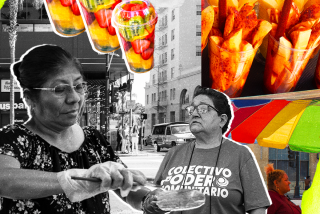Today’s Topic : Panhandling: How far can merchants go in stopping it?
- Share via
Few people would regard panhandling as an honorable way of making money, but begging is certainly an ancient profession.
The concept of begging, according to Madeleine Stoner, an expert on homelessness and a professor of social work at USC, dates back to 17th-Century Elizabethan England. The feudal system was breaking up and, for the first time, people who previously lived on protected manors were without homes or work. “The nation was beset by transients--in effect, homeless people,” says Stoner.
The beggars and transients spread through Western Europe and, eventually to the United States. In times of large waves of immigration, such as the turn of the 20th Century, or in times of economic depression, the numbers of beggars increase.
While no one has even estimated how many people make their living, or part of it, by panhandling, there is an impression that the numbers of people who beg for money are growing and that they are becoming more aggressive in their efforts.
As a result, some communities are instituting programs to encourage residents to donate money to local charities that help the homeless rather than to the panhandlers themselves.
In today’s Platform, activists in Hollywood--where panhandling on Hollywood Boulevard has been a particular problem--debate one such effort to get panhandlers off the streets.
Hollywood’s merchants might examine a similar program in Torrance, where last summer the Police Department and downtown business community teamed to produce a sign displayed by local merchants that asked customers to donate their money to charity.
“It must have been successful,” Torrance Police Officer Don Sherwood says. “The panhandlers have disappeared and we’re not receiving complaints like we used to from ladies who felt they were threatened or scared or intimidated.”
Aggressiveness, however, is not a legal reason to outlaw panhandlers, according to Carol Sobel, a senior staff attorney with the ACLU of Southern California.
“If someone goes beyond the limits, the general rules (of law) protect people,” says Sobel. “But it doesn’t matter if the person is asking for a charitable contribution for the Girl Scouts, for themselves, or to sign a petition. You are allowed to approach someone in a public place and you can’t have special rules to punish poor people asking for help.”
Of course, not all panhandlers are aggressive or, for that matter, are drug and alcohol abusers. “There are some very needy people out there due to factors beyond their control,” says Ron Fagan, a sociology professor at Pepperdine. “But even the advocates are acknowledging that there are panhandlers out there scamming people.”
And since people walking down the street can hardly make that distinction for themselves, says Fagan, programs to help the homeless in other ways are positive, not punitive.
More to Read
Sign up for Essential California
The most important California stories and recommendations in your inbox every morning.
You may occasionally receive promotional content from the Los Angeles Times.













